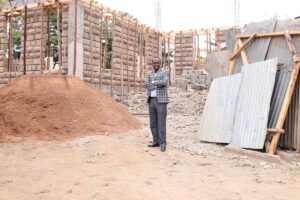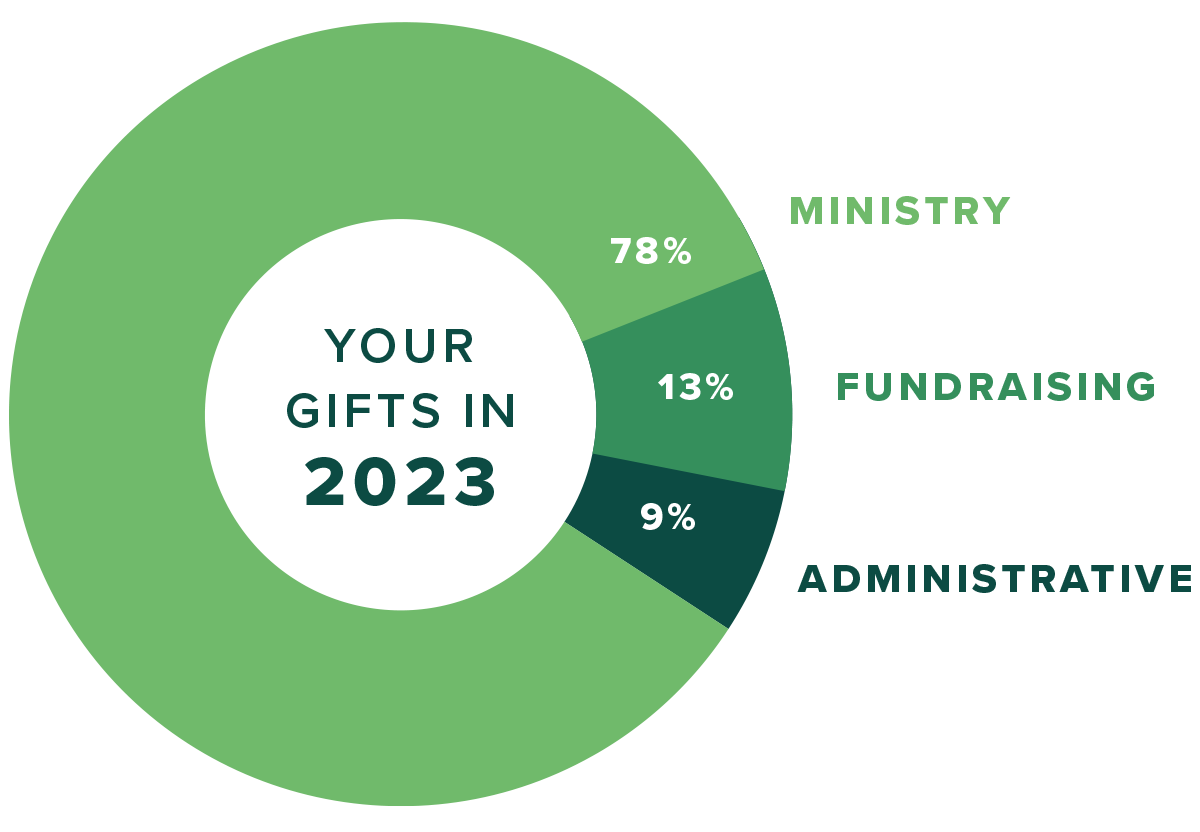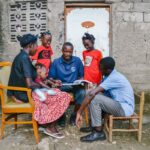A Heart for Kids in Hard Places
A bishop in Kenya shares his story of reluctantly becoming a pastor and then establishing a thriving ministry that serves and helps more than 1,000 kids in poverty achieve their dreams.

Bishop Lomonyak had strong values instilled in him by his parents from a very young age.
Born in 1973 in Mombasa, a coastal town in Kenya, little Lomonyak and his five siblings were raised in a loving, close-knit family.
His dad was a senior civil servant in the Kenya Wildlife Services while his mom stayed at home to care for the kids.
As an employee of Wildlife Services, Lomonyak’s family lived in the game parks, a memory he cherishes dearly.
His parents were also devout Christians and raised the kids to know God.
While living in the parks, they could not access churches easily. But regardless of that, his parents ensured they had fellowship as a family every Sunday and they also prayed together every day.
Values Instilled Early
On Sundays, each of his siblings and parents had a role to play in the fellowship. From leading the hymns to drumming, reading the Bible, sharing the Word, and praying, his parents ensured that they fully participated.
His parents also valued education. As the only one in his family who got an education, his father ensured that Lomonyak and his siblings attended good schools, and he provided for their basic needs.
As a respected civil servant, Lomonyak’s father instilled values in them at a young age.
Lomonyak recalls that one of his father’s most important values was integrity. At his workplace, he was known not to take bribes and was faithful in his work, and he ensured that he passed that value on to his kids.
Lomonyak, now a bishop, recalls an event when he was young. He had been sent to the shop and the shopkeeper accidentally gave him too much change after his purchase. As a child, Lomonyak was excited about the extra change he had and even planned to get a snack on his way to school the following day.
To his surprise when he arrived home, his father asked him to return the excess money to the shopkeeper. He wondered why his father wanted the excess money returned.
“My father told me that whatever I do to someone, I should count it as having done it to myself,” he says. “He asked me if I would be happy if I lost money for having wrongfully given someone more than they deserved.”
Not convinced and angry at his dad, he returned the money. But today, he is grateful for that great value instilled in him.
Journey to Salvation as a Teen
But as Lomonyak completed his primary school education and entered high school, he preferred not to attend church and made some bad choices due to peer pressure.
He says reality checked in on him during his first year of high school at Olkejuado, in 1989.
With a tough father who had threatened not to give him a second chance if he got suspended from school for bad behavior, substance abuse, or succumbing to peer pressure, Lomonyak feared for his future.

Bishop Lomonyak stands in front of a building that is currently being constructed at his church compound. The building will serve as a cathedral.
“I wondered how I would avoid all the peer influence. I felt so helpless, and I questioned if I would ever successfully complete high school,” he recalls.
At that point he decided to give his life to Christ during a weekend gospel concert at the school.
At first, when the concert began, he was sure he didn’t want to attend. Lomonyak told his friends that he would never get saved on earth and thought of salvation as an impossibility.
But as the concert went on, he happened to pass by the hall where it was held.
Upon hearing the music from the hall, he peeped through the window and was amazed at how the musical instruments were being played.
Lomonyak wanted to get a closer look at the instruments, so he went inside the hall, right to the front.
“Back in the village, the only instrument I was exposed to, was a traditional drum,” he says. “So, I was astonished by the drum sets, guitars, and the keyboard. So, I sat and watched, and I marveled at the music.”
After the music finished, Lomonyak says people began praying, and he wanted to sneak out of the hall. But he found himself in the middle of a group of some devoted Christian union members.
He looked for the door, but it was far from where he was, so he sat through the prayers and listened to the preaching.
After the sermon was over, he says he felt the conviction of the Holy Spirit, and when an altar call was made, he went to the front to be prayed for and was born again.
It was a decision he nearly regretted a moment later.
“When I opened my eyes after prayer, I saw my friends on the window of the hall laughing at me. For a moment, I wondered whether I had made the right decision,” he recalls with a laugh.
“But I wanted to honor the promise I was making that day.”

Early on in his career, Bishop Lomonyak learned that there was something special about kids who lived in hard places.
Lomonyak was later elected to the leadership of the Christian union while he was in his second year of high school.
He began a one-on-one ministry in school where he would talk to students about God. They began calling him “pastor,” a name he did not like.
Following His Dreams
While in high school, he knew he wanted to become a hotel manager. He had been inspired by the many visits he and his family had to luxurious hotels in the national parks using complimentary tickets his father had.
He says he admired how managers had the power to issue complimentary tickets to employees of the Wildlife Service, and this motivated him to want to become one.
His high school used to organize mentorship programs and invite people from different professional backgrounds to speak to students. Lomonyak wanted to reward the mentors in the future, as a hotel manager, by giving them complimentary tickets to hotels for vacations.
So, after high school, he applied to Utalii College, the only college in the country at that time that offered hospitality courses.
But the college did not offer him the course he wanted, so he took some time to think things over.
The Road to Ministry
During the days he took off to think about the offer, Lomonyak went out for missions with his church and gave his time to preaching.
That’s when one of his friends suggested taking a degree course in theology that would allow him to work in an organization.
Lomonyak had aspired to be anything but a pastor at a church then.
But he remembers that at that time, there was an NGO in his community that was known to employ pastors or people who had done theology and he wanted to join the organization, so he went to college.

Bishop Lomonyak wasn’t always sure of becoming a pastor, but his work in a poor village changed his mind.
“I knew deep down that I did not want to become a pastor, because then, pastors had to depend on the congregants for an income, and I saw how pastors in the village struggled financially,” Lomonyak says.
“Being a pastor was not a desirable career, but the idea of getting employed in an organization sounded convincing.”
But while he was in Bible college, he says he developed a passion to become a pastor and serve in the church.
After going on a missions trip as a student in college, to Maili Tatu, a remote village in Taita Taveta County, he was inspired to be a pastor in that community.
“I wanted to become a pastor so much that money did not count. In fact, I knew I wanted to minister in that poor and remote community,” Lomonyak says.
He says it became clearer that he wanted to serve in a church in an impoverished community after he realized he still wanted to go to Maili Tatu, despite the then-pastor leaving the church to look for a job because he had no income.
However, some people thought otherwise about his decisions.
“My classmates questioned why I wanted to go and minister in a rural area having attained a degree because most people would opt for the city churches that paid well,” Lomonyak says.
“My siblings were also very sad. They wondered why I was choosing poverty because pastors in our villages were living in poverty,” he says with a burst of laughter. “But my parents were so happy for me, and they fully supported me.”
After college, he began ministry in a town near Nairobi before he got a chance to move to Loitoktok town, a then-remote town 158 miles southeast of Nairobi.
With knowledge gained in college, the young Lomonyak grew the ministry in the church and in turn the number of people in the church grew and they flourished.
Called Into a Hard Place
It is then, he says, that the Lord led him to set up another church in the nearby small town of Kimana.
And in October 2000, after organizing a large crusade in this small town, he founded PEFA Kimana church with approximately 25 people.
In March 2001 the church raised funds and bought a piece of land. They were also able to build a small wooden-walled structure — the first church structure.
Lomonyak says the town had no electricity in those days, no roads, no running water, and no permanent buildings. Most people were farmers and animal herders and knew little about education, so they did not value it.
“I remember walking into a food kiosk to get lunch, and I was served cold food. They told me that food is cooked in the morning because that is when people eat before heading to the farms miles away from the town,” he recalls.
But he says, despite it all, he knew that the Lord had called him into that poor community.
A Passion for Children’s Ministry
With experience from the church in Loitoktok, Lomonyak knew he was equipped for the work in Kimana.
At Loitoktok, not only did the church thrive, but the Sunday school thrived as well.
He says this was something he intentionally did when he was posted at the church, having developed a passion for kids while in college. When he was still in college, a classmate introduced him to the children’s ministry. They started by serving at a nearby primary school, and eventually they served at a juvenile correctional facility.
At the juvenile facility, Lomonyak realized there was something special about kids in hard places.
“They had very difficult histories, but one thing that amazed me was how receptive they were to God’s Word. And with love, I was amazed at how they got transformed.”
However, because kids aren’t often considered important in the community, people who serve them are looked upon as inferior, he says.
“In some of our cultures, kids are not valued, and that, unfortunately, extends to church,” Lomonyak says. “But also, we lack knowledge about what the Bible says about children, yet for the transformation to happen it would best begin at church.”
So he endeavored to teach people about the importance of serving kids and help them change their perception.
Lomonyak was determined to meet the needs of the kids in the community. He created a children’s department, set aside a budget for that, trained the Sunday school teachers, invited children’s ministers from Kenya and Tanzania to speak to the teachers, and held the very first children’s crusade in the community.
Children’s Pastor First
At the crusade that led to the birth of PEFA Kimana church, Lomonyak, then in his 20s, had reached out to kids who were on school holiday, so the crusade was packed with kids.
The community wondered why he was so invested in kids, and being young, they began calling him the “children’s pastor.” Most people didn’t take Lomonyak seriously because he was so invested in kids.

As his church grew, Bishop Lomonyak added more activities for kids, like sports, to keep them busy and out of trouble.
“Many parents in Kimana did not care where their kids went on Sunday,” he says, “But that was a blessing because the parents allowed the kids to come to church even when they did not attend church at all. They would even drop off and pick kids up after church.”
Feeding the Children
The church also set up a feeding program for the kids after they realized that most of the kids did not have parents at home, let alone food to eat before or after church.
At first, Sunday school ended at 9 a.m. so the kids would be left to roam around the village.
“The parents go to the big horticultural farms, and they are paid according to the hours they have labored,” Lomonyak explains. “So, you find mothers leaving home as early as 5 a.m. and coming back at 8 p.m. to, at times, prepare the only meal. Yet kids are asleep at that time.”
So, the church introduced other activities like sports and life-skills classes that would extend until noon, and that allowed them to provide food for the kids, too.
Twenty-three years later, the Sunday school has a membership of over 400 kids, and the church also runs a primary and junior secondary school with 600 kids.
Many of the young people from those early days are now serving in the church, some as elders.
Hope Center Comes to Town
In 2022, after years of reaching out to and being in touch with the OneChild field office in Kenya, Lomonyak helped establish a Hope Center at the church, and more kids from poor families in the community were registered into the sponsorship program.
Most of the kids at the Hope Center do not attend church there, and neither do their parents. Lomonyak says reaching them is a blessing that came with the Hope Center.
“The Hope Center has helped us reach kids and families that I doubt we would have had access to,” he says. “A year later, kids who were not in school before are now all in school, and I believe this is the beginning of the transformation of their families and this community.”
Bishop Lomonyak is also thankful for his family of four kids and his wife who have greatly supported him in ministry over the years. His wife, Mercy, supports the church by serving as the leader of the youth ministry and is also a pastor.
His prayer for the kids he serves is for them to know that they are loved and to experience God’s love in life. He also hopes that God can equip all Child Champions with what is needed to help the kids thrive in life.
According to Bishop Lomonyak, a child who is thriving is one who feels loved, is resilient, and is hopeful about achieving his or her dreams.
Help a child in poverty achieve his or her dreams. Sponsor a child today!
We are accountable to the children we serve AND to our donors.
Our accountability to our donors is one of our highest priorities. Our goal is to use the funds entrusted to us as wise stewards. To do this requires continued monitoring of our fund distribution. OneChild is also a member in good standing with the Evangelical Council for Financial Accountability (ECFA)







